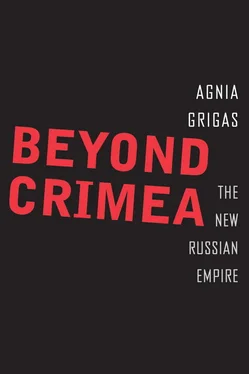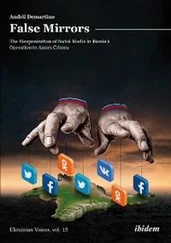Agnia Grigas - Beyond Crimea
Здесь есть возможность читать онлайн «Agnia Grigas - Beyond Crimea» весь текст электронной книги совершенно бесплатно (целиком полную версию без сокращений). В некоторых случаях можно слушать аудио, скачать через торрент в формате fb2 и присутствует краткое содержание. Город: New Haven, Год выпуска: 2016, ISBN: 2016, Издательство: Yale University Press, Жанр: Политика, Публицистика, на английском языке. Описание произведения, (предисловие) а так же отзывы посетителей доступны на портале библиотеки ЛибКат.
- Название:Beyond Crimea
- Автор:
- Издательство:Yale University Press
- Жанр:
- Год:2016
- Город:New Haven
- ISBN:978-0-300-21450-5
- Рейтинг книги:4 / 5. Голосов: 1
-
Избранное:Добавить в избранное
- Отзывы:
-
Ваша оценка:
- 80
- 1
- 2
- 3
- 4
- 5
Beyond Crimea: краткое содержание, описание и аннотация
Предлагаем к чтению аннотацию, описание, краткое содержание или предисловие (зависит от того, что написал сам автор книги «Beyond Crimea»). Если вы не нашли необходимую информацию о книге — напишите в комментариях, мы постараемся отыскать её.
[Contain tables.]
Beyond Crimea — читать онлайн бесплатно полную книгу (весь текст) целиком
Ниже представлен текст книги, разбитый по страницам. Система сохранения места последней прочитанной страницы, позволяет с удобством читать онлайн бесплатно книгу «Beyond Crimea», без необходимости каждый раз заново искать на чём Вы остановились. Поставьте закладку, и сможете в любой момент перейти на страницу, на которой закончили чтение.
Интервал:
Закладка:
DRIVERS OF IMPERIAL REVIVAL
Simply put, this book will argue that reimperialization—either by regaining lost territories or by maintaining influence and sometimes regaining it where it has been lost—is the end-goal of Moscow’s policies. The politically constructed Russian compatriots are one of the means. In some regards this claim of reimperialization is less controversial than it sounds, since one of the seminal theories of international relations, realism, assumes that a state’s primary interest lies in maximizing its power and resources. Nonetheless, a number of questions remain about why, weighing its abilities and constraints as well as the costs and benefits, Russia would seek reimperialization. What are the drivers that lead the Russian elite and the government of Vladimir Putin to rebuild the Russian empire? The ideological-historical, structural, political, and economic drivers of Russian motives and interests are sometimes the same and sometimes vary in regard to the different post-Soviet states. Putin’s regime has emphasized the ideological themes of uniting the divided Russian nation and of Russia’s mission in the world stemming from its unique cultural identity as the home of Slavic and Orthodox Christian civilization. Russia’s self-perception is one of empire, and this ideology has been created over the centuries of Russia’s history as a multiethnic imperial state where the Russian nation held a privileged position. As the Russian empire is strongly wedded to the Russian national psyche so Russian imperialism is wedded to Russian nationalism. 40Opinion polls show that from 1996 to 2012 among the primary expectations of the Russian public from their president has been to restore or maintain “Russia’s superpower status.” 41The Russian civilization, nation, and in turn the compatriots figure prominently in Moscow’s ideological, historical, and cultural rationales for reimperialization. In this unique blend of nationalist and imperialist ideology, the compatriots are parts of the “body” of Russia and of Russian civilization.
The Russian empire has also historically served as means to Moscow’s security. The Muscovites were under siege from both Europe and Asia: from the Mongol hordes in the thirteenth century to Napoleonic armies in 1812. The states of the Caucasus and Central Asia and their territories served as a buffer zone for Russia in the south against Islamic civilizations of the Middle East. Ukraine, Belarus, and Moldova continue to serve as buffer zones against Europe and now NATO, while the Baltic States (now NATO members) are sorely missed from Moscow’s zone of influence. At the same time Russia and all former Soviet republics (excluding the Baltic States) are now members of NATO’s Partnership for Peace program. Nonetheless, recurring talks for NATO membership for, say, Georgia or Ukraine have caused a violent reaction (both metaphorically and literally speaking) in Moscow. Despite Tbilisi’s or Kiev’s right to choose its foreign policy, Moscow still perceives these states as part of its neo-imperial project.
When assessing Russia’s foreign policy priorities vis-à-vis the former Soviet republics, one could question if rather than reimperialization, Moscow’s agenda is solely one of limiting the foreign policy options of the former Soviet republics—preventing their integration into the EU and NATO and instead ensuring their deep integration into Moscow-led economic and political institutions. This would guarantee “good-neighborly relations” between Russia and the post-Soviet world. 42Yet, this perspective stems from the notion that Russia is entitled to special interests within a sphere of influence or in the words of Doyle, that “one state controls the effective political sovereignty of another political society.” 43One could also conclude that Moscow is seeking to create a new and alternative order in the post-Soviet space. At a minimum, this would entail the Eurasian Economic Union—a Moscow-led political and economic union between Russia, Armenia, Belarus, Kazakhstan, and Kyrgyzstan established in 2015, replacing the Eurasian Customs Union of 2010 and the prior Eurasian Economic Community of 2000. At a maximum, Moscow’s plans for the post-Soviet space would entail a new political entity that would include within its borders Russia, Ukraine, Belarus, and Kazakhstan. 44
Within the security rationale for reimperialization, the Russian compatriots also play an important role. By taking over territories inhabited by compatriots, Moscow is able to establish stronger defenses and borders than if it were to take over potentially less loyal territories. Furthermore, national security and power are in no small part a function of size. Russia’s population is less than half that of the United States, about one-third that of the European Union, and only one-eighth that of China. Russia’s compatriot policy coupled with reimperialization enlarges Russia’s population and territories.
There are also domestic electoral factors stoking Putin’s expansionist drive. Russia’s military exploits—taming Chechnya’s rebellion, victory in the Russo-Georgian war, taking back Crimea, “protecting” Russians in southeastern Ukraine—have all boded well for Putin’s personal popularity. Putin first made a name for himself as Russia’s new president elect when he sent troops to Chechnya in January of 2000, gaining an 84 percent approval rating. 45In 2014 pending Crimea’s annexation, Putin’s approval rating was 72 percent, marking a three-year high after several years of decline, which continued to increase to 85 percent by the end of 2014, almost as high as in 2008 following the Georgian war when his approval rating was 88 percent. 46Compatriots also feed into in the domestic motives for reimperialization because their incorporation into the Russian Federation appeals to the strong ethnic and cultural dimensions of Russian national rather than civic identity. Finally, another domestic factor in Russia’s drive for reimperialization, or perhaps more precisely an effort to hold on to its sphere of influence, is driven by the fear of and desire to contain the success of popular movements calling for regime change that have swept the post-Soviet space. The “colored” popular revolutions started with Georgia’s Rose Revolution in 2003, Ukraine’s Orange Revolution in 2004, Kyrgyzstan’s Tulip Revolution of 2005, Moldova’s Grape or Twitter Revolution in 2009, and Ukraine’s Maidan of 2013–14. The overturning of stagnant and corrupt regimes could only serve as an example to the Russian people, and Moscow’s massive public protests in 2011–13 only reinforced this potential threat to the Putin regime.
There are also economic motives behind Russia’s imperial hold on the post-Soviet space. Russia has worked hard to maintain the post-Soviet states in its economic fold by its Eurasian Customs Union and Eurasian Economic Union projects. However, the alternative of EU membership also held appeal for a number of CIS states, including Georgia, Moldova, Ukraine, Armenia, and Azerbaijan, which defied Moscow and started negotiating association agreements and working to meet the conditionality requirements. It is no coincidence that flashpoints between Russia on the one hand and Moldova, Georgia, Armenia, and Ukraine on the other occurred when these countries were seeking closer ties to the EU. The resulting conflicts and challenges to Moldova’s, Georgia’s, and Ukraine’s territorial integrity will serve as a significant hindrance to these states’ aspirations to join the EU in the future.
When assessing Moscow’s economic interests and motives for reimperialization, it is imperative to understand that the Russian economy is driven by natural resources. Countries that either possess such resources or provide land and sea routes to export them to other markets are and historically have been potential targets of Russia’s expansion. Through the territories of Ukraine and Belarus, pipelines export Russian energy sources to European markets. The pipeline crossing Ukraine transports up to half of Russian gas exports to Europe, while the ports of Crimea offer quick access to the eastern Mediterranean, the Balkans, and the Middle East. The ports of the Baltic States have historically served to transport Russia’s oil and oil products to European markets until the mid-2000s. Kazakhstan, Uzbekistan, and Turkmenistan themselves possess vast resources of coal, oil, and gas. Through Georgian territory runs the competing Baku-Tbilisi-Ceyhan oil pipeline, the second longest of the former Soviet Union, which brings Caspian (instead of Russian) oil to Turkey and the Mediterranean. 47Russia’s own vast energy resources have served as powerful means of influence in the near abroad. Members of the Russian diaspora have played their part in this great game of energy influence. Looking across the CIS states, the Baltic States, and beyond, politicians and businessmen loyal to Moscow (often but not always ethnically Russian and with connections to the Kremlin) have benefited from lucrative energy contracts and advantageous deals. 48Corrupt deal-making has allowed Moscow to put in its pocket a number of politicians not only from its near abroad but increasingly from the EU. 49
Читать дальшеИнтервал:
Закладка:
Похожие книги на «Beyond Crimea»
Представляем Вашему вниманию похожие книги на «Beyond Crimea» списком для выбора. Мы отобрали схожую по названию и смыслу литературу в надежде предоставить читателям больше вариантов отыскать новые, интересные, ещё непрочитанные произведения.
Обсуждение, отзывы о книге «Beyond Crimea» и просто собственные мнения читателей. Оставьте ваши комментарии, напишите, что Вы думаете о произведении, его смысле или главных героях. Укажите что конкретно понравилось, а что нет, и почему Вы так считаете.












